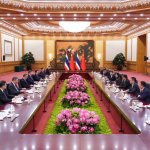
It was supposed to be another good coup. Prayut Chan-o-cha and his band of Royal Thai Army loyalists promised to return “happiness to the people,” or at least that is how it was advertised. And sadly, some took the bait. A junta event that featured live music, free medical exams, and opportunities to have selfies taken with Thai soldiers drew a fairly large crowd.
The National Council for Peace and Order (NCPO) declared it was absolutely necessary to take power from the caretaker Yingluck government in order to resolve the political crisis that had befallen the country in the months prior to the May 2014 coup d’état.
But it was all a lie.

The military, which had snatched democracy from the hands of the people on many occasions in the past—including the events of 1976, 1992, 2006, and 2014—had succeeded once again.
In addition, it suspended the 2007 Constitution with a monstrosity of its own making, then pushed a flawed version upon the people, all the while cracking down on any form of dissent. At the head of most of these decisions was Prayut, who accelerated his attacks on democracy and its related institutions. Prayut on several occasions had promised to return democracy to the Thai people as early as October 2015 and again by November 2018, but it never truly arrived.
Thailand instead received a constitution loaded with special favors for the military and the monarchy. King Maha Vajiralongkorn was allowed to travel abroad without a regent named in his absence—a controversy that continues to this day, the charter gave Prayut sweeping powers, as well as a hand-picked Senate stocked with military officers and police.
Since the day it assumed power, Prayut’s government, through its enabling organization, the NCPO, has brutalized the Thai people, waging its own private war against criticism and public dissent. When the junta finally lifted a long prohibition on public gatherings and political activities, it kept military powers to limit expression and sweeping authority to punish its enemies. Two announcements, 97/2014 and 103/2014 created environments where legitimate criticism could be seen as damaging national security and prohibited the dissemination of information that would undermine its authority by targeting or suspending television and radio programs through the National Broadcasting and Telecommunications Commission (NBTC).
A lengthy list could follow that further document the damage the military-backed regime has done to Thailand over the course of the past several years—including the arrests of numerous academics, activists, and the ban of a major opposition party and its charismatic leader. However, Prayut is a symptom of a larger problem that has plagued Thailand for decades. Described by academics as the “coup trap” where the experience of one coup, will likely facilitate another because interventions by the military are not often accompanied by improvements to government institutions. Interference leads to further interference in the future. This has been evidenced by fears of another coup that would oust Prayut, who had fallen out of favor and lost public confidence in his ability to revive the economy or restore his public legitimacy.
Still, there are other causes that remain persistent challenges. Prayut has, like governments before him, have failed to restructure Thailand’s export and tourism-dependent economy. The status quo in Thailand has led to extreme income inequality and a massive informal sector. As the economy worsens, it fuels economic anxieties and the need for structural reforms that are being advocated by the youth-led protesters. The elites have essentially built an economic system where the bottom 10 percent of the country owns no wealth at all and the richest 10 percent owns more than 85 percent. While this strategy of low-skilled labor and a boom in exports vaulted Thailand to middle-income country status, it hasn’t benefited the majority of Thai households, who because of COVID-19 and a flagging economy are drowning in debt.
Until Thailand commits to broader structural changes, which should include structural improvements to major institutions—electoral, legislative, judicial, military and monarchical—and an inclusive, transparent process in the creation of its 21st Constitution, necessary changes in Thailand will remain trapped in its vicious cycle of political and legitimacy crises followed by the ubiquitous coup d’état. Without them, Prayut’s departure—either now or into the future—will have meant nothing.






